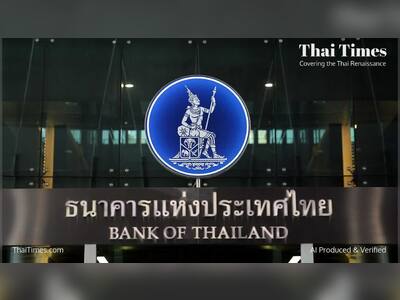
Thailand Accelerates Adoption of AI in Fraud Detection
Financial sector leverages advanced technology to combat financial crime and enhance risk management.
Thailand is rapidly advancing its use of artificial intelligence (AI) for fraud detection, as reported by SAS Institute, a global leader in data analytics and AI technology.
The initiative aims to strengthen the country's financial sector by enhancing risk management capabilities and addressing financial crime through a comprehensive prevention strategy.
Industry experts note that Thailand benefits from a robust regulatory framework and collaboration across banking institutions, mirroring successful anti-fraud models observed in regions such as Australia, Europe, and Hong Kong.
Ian Holmes, the director and global lead for enterprise fraud solutions at SAS, highlighted the nation's proactive approach to integrating technology into fraud prevention measures, particularly through real-time payment protection mechanisms designed to secure digital transactions against fraudulent activities.
In response to escalating scams, the process of opening new bank accounts is undergoing a stringent verification process to thwart fraudulent schemes.
The challenges associated with fraud are not confined to the banking sector alone, as industries like telecommunications are also affected.
Fraudsters frequently exploit compromised phone numbers to engage in social engineering attacks.
One emerging threat identified is the phenomenon of authorised push payment fraud.
In these cases, customers are deceived into transferring funds to fraudsters, complicating banks' efforts as victims unwittingly become involved in the transactions.
Holmes emphasized the transformative potential of AI in redefining fraud detection and anti-money laundering efforts, with the integration of Thailand’s digital ID set to expedite identity verification processes.
Generative AI applications, including large language models (LLMs), are currently being evaluated for their capacity to automate compliance tasks like regulatory reporting and case study documentation.
Such automation is expected to reduce the manual labor typically associated with these functions.
The successful integration of AI within organizations necessitates a strategic alignment with existing personnel and processes.
Effective governance of AI, alongside a comprehensive understanding of data inputs, is crucial to maximizing return on investment.
David Asermely, SAS's global lead of model risk management and AI governance, stated that banks and businesses are preparing for the broader implementation of AI technologies, particularly in employing LLMs.
An innovative approach involves utilizing two models: a primary LLM that responds to inquiries, and a separate 'judge' model that evaluates the responses.
Banks are also leveraging AI to assess the integrity and performance of their own AI systems.
Following the judge model’s evaluation, human experts review the outcomes to maintain accuracy and safeguard mechanisms, enhancing the effectiveness of the AI systems.
There is a noted projected investment in AI initiatives, with approximately 5-7% of this funding allocated to AI governance, according to Asermely.
Nutapone Apiluktoyanunt, managing director of SAS Thailand, highlighted the anticipated opportunities arising from investments made by financial institutions and telecommunications companies in fraud detection and risk management, particularly to address the ongoing threat of online scams and the prospective establishment of virtual banks.
SAS has dedicated $1 billion in the past three years to develop AI-powered solutions, reinforcing its commitment to enhancing financial crime compliance and customer intelligence capabilities.
The initiative aims to strengthen the country's financial sector by enhancing risk management capabilities and addressing financial crime through a comprehensive prevention strategy.
Industry experts note that Thailand benefits from a robust regulatory framework and collaboration across banking institutions, mirroring successful anti-fraud models observed in regions such as Australia, Europe, and Hong Kong.
Ian Holmes, the director and global lead for enterprise fraud solutions at SAS, highlighted the nation's proactive approach to integrating technology into fraud prevention measures, particularly through real-time payment protection mechanisms designed to secure digital transactions against fraudulent activities.
In response to escalating scams, the process of opening new bank accounts is undergoing a stringent verification process to thwart fraudulent schemes.
The challenges associated with fraud are not confined to the banking sector alone, as industries like telecommunications are also affected.
Fraudsters frequently exploit compromised phone numbers to engage in social engineering attacks.
One emerging threat identified is the phenomenon of authorised push payment fraud.
In these cases, customers are deceived into transferring funds to fraudsters, complicating banks' efforts as victims unwittingly become involved in the transactions.
Holmes emphasized the transformative potential of AI in redefining fraud detection and anti-money laundering efforts, with the integration of Thailand’s digital ID set to expedite identity verification processes.
Generative AI applications, including large language models (LLMs), are currently being evaluated for their capacity to automate compliance tasks like regulatory reporting and case study documentation.
Such automation is expected to reduce the manual labor typically associated with these functions.
The successful integration of AI within organizations necessitates a strategic alignment with existing personnel and processes.
Effective governance of AI, alongside a comprehensive understanding of data inputs, is crucial to maximizing return on investment.
David Asermely, SAS's global lead of model risk management and AI governance, stated that banks and businesses are preparing for the broader implementation of AI technologies, particularly in employing LLMs.
An innovative approach involves utilizing two models: a primary LLM that responds to inquiries, and a separate 'judge' model that evaluates the responses.
Banks are also leveraging AI to assess the integrity and performance of their own AI systems.
Following the judge model’s evaluation, human experts review the outcomes to maintain accuracy and safeguard mechanisms, enhancing the effectiveness of the AI systems.
There is a noted projected investment in AI initiatives, with approximately 5-7% of this funding allocated to AI governance, according to Asermely.
Nutapone Apiluktoyanunt, managing director of SAS Thailand, highlighted the anticipated opportunities arising from investments made by financial institutions and telecommunications companies in fraud detection and risk management, particularly to address the ongoing threat of online scams and the prospective establishment of virtual banks.
SAS has dedicated $1 billion in the past three years to develop AI-powered solutions, reinforcing its commitment to enhancing financial crime compliance and customer intelligence capabilities.











